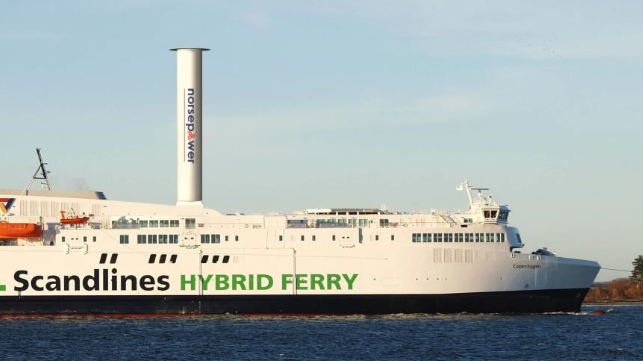Scandlines to Install Flettner Rotor on Hybrid Ferry

Danish ferry operator Scandlines announced Wednesday that it will be installing a rotor sail on the hybrid ferry Copenhagen, putting the vessel among the ranks of the lowest-emission passenger ships in the Baltic region.
The competition in this category is fierce. New "green" ferries in the region include the Color Hybrid, the world's biggest plug-in hybrid ferry, and the powerful all-electric car ferry Ellen, which has the largest battery pack installed on any vessel today. The Copenhagen's new upper-deck rotor sail will complement the effiency of her hybrid drive system, and the novel structure will set her appearance apart from the crowd.
Norsepower Oy will supply Scandlines with its modernized version of the Flettner rotor – a spinning cylinder that uses the Magnus effect to harness wind power and generate thrust. Norsepower says that its design is the first verified and commercially operational auxiliary wind propulsion technology for the maritime industry (though the similar ECO FLETTNER rotor may soon enter the market). The installation aboard the Copenhagen will be Norsepower's fourth.
The Flettner rotor doesn't generate enough thrust to move the ship on its own, but it provides a boost to supplement the ship's engines. When wind conditions are favorable, it lets the bridge team throttle back while maintaining the same speed, saving fuel. Its utility for a particular application varies by vessel type and by the prevailing winds on the vessel's route. Air draft and deck layout are also considerations for some installations.
The Copenhagen operates on a north-south route between Gedser, Denmark and Rostock, Germany. This route is almost perpendicular to the prevailing wind from the west, giving Scandlines favorable conditions for using rotor sails on the ferry crossing. “By installing a rotor sail, we can reduce CO2 emissions on the Rostock-Gedser route by four to five per cent,” said Scandlines CEO Søren Poulsgaard Jensen.
NABU, the German Nature and Biodiversity Conservation Union, said that Scandline's decision to install a rotor sail sets an example that other companies should follow. "With rotors besides hybrid drives, the company sets new standards in terms of integrating different technical solutions to mitigate especially climate and air pollution emissions," said NABU head of environmental policy Malte Siegert.
